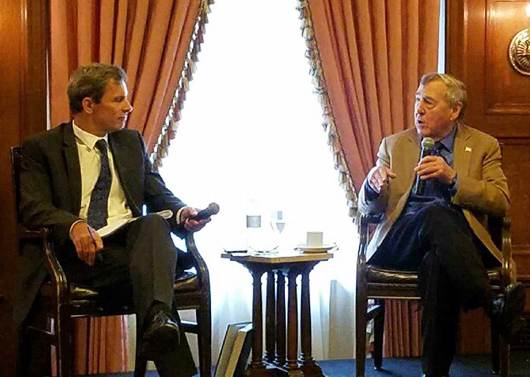
LAWAC President Terry McCarthy with Graham Allison (right)
The US has been the lone superpower since the end of the Cold War, but China is catching up fast – faster than most Americans yet realize, according to Graham Allison, the founding dean of Harvard’s Kennedy School. And that is a problem, because throughout history Professor Allison can show multiple examples of established powers being challenged by rising powers, and war ensuing.
“There is no person in Washington who wants war with China, and there is no person in Beijing who wants war with the US. Both sides are very clear that this would be a catastrophe,” Allison told a LAWAC Global Café breakfast meeting on June 5th at the California Club. “But how do you get somewhere where nobody wants to go?” As an example, Allison laid out the “constant game of chicken” that is going on between the US Navy and Chinese coastguard vessels in disputed areas of the South China Sea, and painted a scenario of an accidental collision leading to a Chinese ship sinking, retaliation by air by the Chinese against the US ship, missiles exchanged, a US aircraft carrier getting involved… and before either side can stop it a full-scale war breaks out.
Other scenarios that could lead to war between the US and China might include a conflict over Taiwan, a US preemptive attack on North Korea or even a trade dispute that spirals out of control. Of course if a US destroyer accidentally sank a British coastguard vessel, there is no chance of the incident leading to war. The reason things are different with China is what Allison has come to call “The Thucydides Trap”. Thucydides was the great Greek historian who wrote the ground-breaking “History of the Peloponnesian War” which explained how Athens and Sparta ended up in a devastating 27 year-war which neither side wanted. “It was the rise of Athens and the fear that this instilled in Sparta that made the war inevitable,” Allison quoted Thucydides as writing, and pointed to 16 similar cases of a rising power (like Athens) challenging an established power (like Sparta) throughout history. In 12 of these cases, war broke out – including Prussia against France in 1870-71, Japan against Russia 1904-05 and Britain against Germany in 1914.
China’s rise has been so rapid that “Americans just don’t get it,” as former Singaporean Prime Minister Lee Kuan Yew told Allison. China’s GDP per capita was $200 in 1980 – it is now $8,000, a forty-fold increase. China is the world’s largest producer of ships, steel, clothing, cell phones and computers, and Chinese consumers buy more cars than Americans or anyone else. The world’s biggest economy in 1820 is likely to re-attain that status in the near future – in fact, calculated by purchasing power parity (PPP), China actually overtook the US as the world’s largest economy in 2014. The problem, says Allison, is that after so long at the top, “Americans can’t imagine another country bigger and better than them – it’s un-American.” Both the US and China have “extreme superiority complexes – we believe we are better, and the Chinese believe nobody else can become Chinese.”
The challenge facing policy-makers in Washington is how to accommodate China’s rapid growth and its expectations that it will be given more weight and respect internationally. “The reemergence of a 5,000 year-old civilization with 1.4 billion people is not a quick fix,” says Allison. But he says that there is no reason why we have to make the same mistakes that people made in 1914 before World War I. There are lessons to be learned from the four cases of the Thucydides Trap that did not result in war – for example the ceding of power peacefully by the British to the US in the twentieth century. And he said that both Trump administration officials and Chinese leader Xi Jinping’s advisors are all “very aware” of the dangers of the Thucydides Trap, and actively thinking of ways to avoid it. Reading Allison’s well-researched and thought-provoking book Destined for War: Can America and China Escape Thucydides’s Trap? would be a good place to start.
